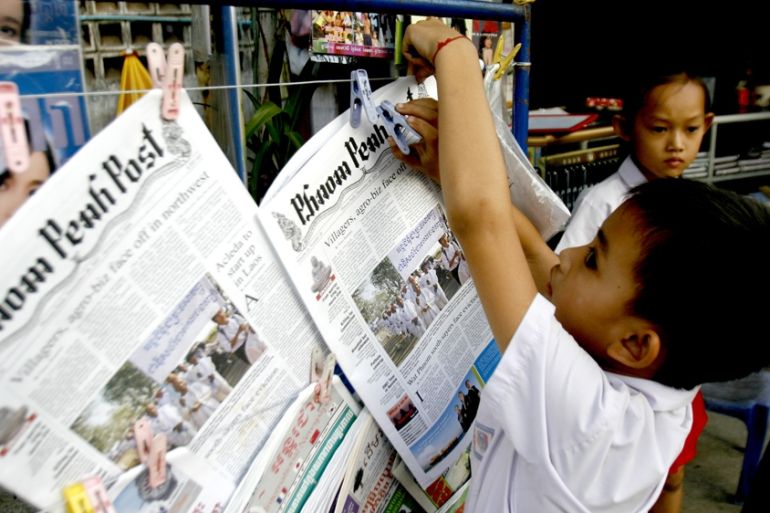Cambodia’s Phnom Penh Post sold to Malaysian Sivakumar G
Publisher blames falling revenues for sale but others suspect Hun Sen government coercion in run-up to July’s elections.

Cambodia’s English-language daily, the Phnom Penh Post, has been bought by a Malaysian businessman, according to its chairman.
The news comes amid a crackdown by Hun Sen, Cambodia’s prime minister, and his allies against perceived critics, including opposition politicians, independent media and human rights groups before elections in July.
Keep reading
list of 4 itemsNPR editor resigns after accusing US outlet of liberal bias
Lawmakers brawl as Georgian Parliament considers ‘foreign agent’ bill
Journalist loses foot after being badly wounded in Israeli attack in Gaza
Bill Clough, chairman of Post Media Ltd, publisher of the Phnom Penh Post, said in a statement on Saturday the company had been sold to Sivakumar G (Siva), a little-known investor.
Chad Williams, the newspaper’s former editor-in-chief, said the government may have coerced the sale.
Founded in 1992, the Phnom Penh Post was reportedly slapped with a $5m tax bill last year, according to reports by the Australian Broadcasting Corporation (ABC).
“From the outside looking in, the most troubling thing is the timing of the tax bill’s settlement and the Post’s subsequent sale,” Williams told Reuters news agency.
“The odds of them not being connected seem incredibly remote.”
“That’s troubling because it suggests the Cambodian government may have used the threat of a shutdown to essentially coerce the sale.”
Run-up to elections
The Phnom Penh Post’s sale could signal the end of independent media in Cambodia in the lead-up to the elections.
Hun Sen is almost certain to win the vote after the main opposition Cambodia National Rescue Party (CNRP) was dissolved by the Supreme Court last year at the request of Hun Sen’s party.
In his statement, Clough said the tax issue had been resolved and a court decision to confiscate the newspaper’s assets has been cancelled until an appeal is finished.
Describing Sivakumar G as “a well-respected newspaperman”, he blamed the sale on declining advertising revenues.
“The recent times have been a challenge, as the worldwide decline in market share for newspaper advertising has also been felt here in Cambodia,” Clough said.
However, he said, the Phnom Penh Post had been under a spotlight before the election “as the last remaining truly independent media group in the country”.
Huy Vannak, undersecretary of state at the interior ministry, denied the accusation about the sale of Phnom Penh Post.
“It is a normal business, and it remains a newspaper,” he told Reuters.
And in a statement, Sivakumar G said he would uphold the newspaper’s legacy and independence.
Cambodia Daily, another English-language paper, was shut down last year after it was given a month by the government to settle a $6.3m tax bill.